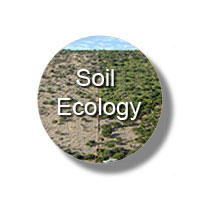|
 Read the text and get ready to a test work
SOIL ECOLOGY
1. Soil ecology is the study of the interactions among soil organisms, and between biotic and abiotic aspects of the soil environment. It is particularly concerned with the cycling of nutrients, formation and stabilization of the pore structure, the spread and vitality of pathogens, and the biodiversity of this rich biological community. Soil is made up of a multitude of physical, chemical, and biological entities which, together with the proper amounts of air and water, supply sustenance for plants as well as mechanical support.
2. The diversity and abundance of soil life exceeds that of any other ecosystem. Plant establishment, competitiveness, and growth is governed largely by the ecology below-ground.
An incredible diversity of organisms makes up the soil food web. They range in size from the tiniest one-celled bacteria, algae, fungi, and protozoa, to the more complex nematodes and micro-arthropods, to the visible earthworms, insects, small vertebrates, and plants. As these organisms eat, grow, and move through the soil, they make it possible to have clean water, clean air, healthy plants, and moderated water flow.
3. Soil organisms decompose organic compounds, including manure, plant residues, and pesticides, preventing them from entering water and becoming pollutants. They sequester nitrogen and other nutrients that might otherwise enter groundwater, and they fix nitrogen from the atmosphere, making it available to plants. Many organisms enhance soil aggregation and porosity, thus increasing infiltration and reducing surface runoff. Soil organisms prey on crop pests and are food for above-ground animals.
4. Research interests span many aspects of soil ecology and microbiology. Fundamentally, researchers are interested in understanding the interplay among microorganisms, fauna, and plants, the biogeochemical processes they carry out, and the physical environment in which their activities take place, and applying this knowledge to address environmental problems.
From Wikipedia
Test
Read the text and get ready to a test work
SOIL ECOLOGY
1. Soil ecology is the study of the interactions among soil organisms, and between biotic and abiotic aspects of the soil environment. It is particularly concerned with the cycling of nutrients, formation and stabilization of the pore structure, the spread and vitality of pathogens, and the biodiversity of this rich biological community. Soil is made up of a multitude of physical, chemical, and biological entities which, together with the proper amounts of air and water, supply sustenance for plants as well as mechanical support.
2. The diversity and abundance of soil life exceeds that of any other ecosystem. Plant establishment, competitiveness, and growth is governed largely by the ecology below-ground.
An incredible diversity of organisms makes up the soil food web. They range in size from the tiniest one-celled bacteria, algae, fungi, and protozoa, to the more complex nematodes and micro-arthropods, to the visible earthworms, insects, small vertebrates, and plants. As these organisms eat, grow, and move through the soil, they make it possible to have clean water, clean air, healthy plants, and moderated water flow.
3. Soil organisms decompose organic compounds, including manure, plant residues, and pesticides, preventing them from entering water and becoming pollutants. They sequester nitrogen and other nutrients that might otherwise enter groundwater, and they fix nitrogen from the atmosphere, making it available to plants. Many organisms enhance soil aggregation and porosity, thus increasing infiltration and reducing surface runoff. Soil organisms prey on crop pests and are food for above-ground animals.
4. Research interests span many aspects of soil ecology and microbiology. Fundamentally, researchers are interested in understanding the interplay among microorganisms, fauna, and plants, the biogeochemical processes they carry out, and the physical environment in which their activities take place, and applying this knowledge to address environmental problems.
From Wikipedia
Test
|
|